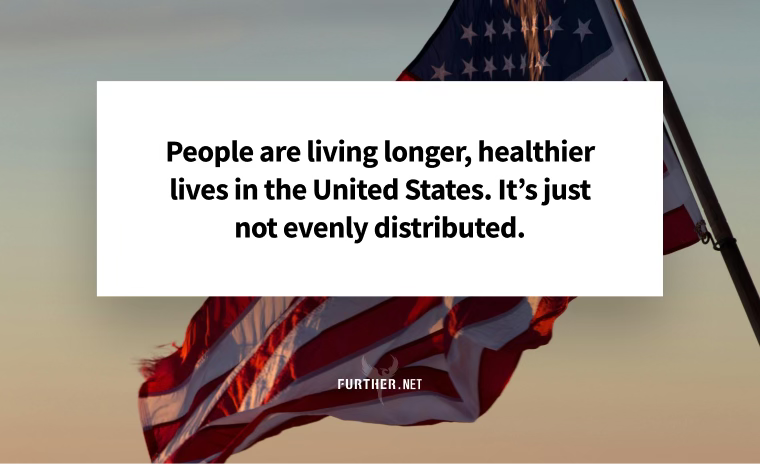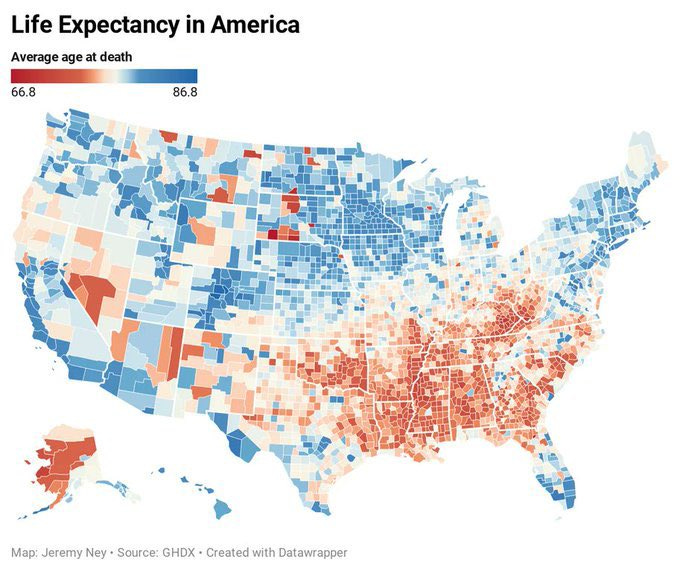The Longevity Divide for Midlife Americans
Why does life expectancy in the United States lag behind other wealthy countries?
The Longevity Squeeze is a big problem with a positive development at its core.
People are living longer, healthier lives. And with impending age-reversal treatments looking to be a real possibility in the next 20 years, Generation X may be the first cohort to live much longer than current life expectancies.
While you may feel optimistic that this extended longevity applies to you, you may also be wondering how this can be the case in general.
After all, isn’t life expectancy in the United States dropping? And aren’t a disproportionate number of working-class Gen X Americans dying young?
It’s true that longevity around the world decreased in 2020 due to COVID-19. And after the arrival of vaccines, the level rebounded in countries worldwide. But not in the U.S.
Even now, in 2025, average life expectancy in the States is only 79.4 years, lagging behind other wealthy countries where the average is around 82.5 years.
So why do financial planners say to save as if you’re going to live into your mid-90s? Is this just an odd version of “worst case scenario” for wealthy people?
And as for those coming medical breakthroughs, bioethicists already worry that the cost of age-reversal treatments may make them available only to the very rich.
But we don’t have to look into the future to see a great divide in longevity rates.
It’s happening in the United States right now. The key is to take a closer look at how “life expectancy” is determined, while also challenging the notion of a “United” States.
Spoiler alert: The basis for the divide doesn’t necessarily come down to those who have money versus those who don’t. In many ways, the deciding factor is cultural.
The U.S. Life Expectancy Conundrum
By definition, life expectancy is based on an estimate of the average age that members of a particular population group will reach when they die.
Given that we’re dealing with an average, it doesn’t really reflect how long older people live. In fact, few people will actually die at age 79, or whatever expectancy number we may have at any given time.
When it comes to lifespan, as opposed to the statistical average that determines life expectancy, some percentage of humans have always lived into their later years. The difference now is that more people make it to “very old” because far fewer die young.
The biggest component of the remarkable increase in life expectancy over the last 120 years is a massive decrease in child mortality. But that’s not all, as fewer people in their twenties, thirties, forties, and fifties died in that time frame as well.
That’s why if you survive to age 65, you’re statistically likely to make it into your mid-80s. Make it to 80, and you’re more likely to hit 90.
We know COVID-19 disproportionately impacted older people when it came to fatalities. But you may be surprised to learn that once the pandemic was accounted for, the continued drop in US life expectancy is from deaths of people under 50, which includes an alarming number of Millennials.
There has also been a disturbing return of higher child mortality rates compared to other wealthy nations, with gun violence being the leading cause of death among children and teens.
And the Standard American Diet definitely puts the U.S. at a disadvantage compared with other countries, especially when it comes to cardiometabolic conditions — a category that includes diabetes, heart disease, and high blood pressure. But Americans also die at an earlier age due to drug overdoses, gun violence, suicides, car crashes, acute alcoholism, and a lack of universal healthcare.
Contrary to what you may think, having a higher income doesn’t necessarily protect you from an early death in the United States. Statistically, wealthier Americans are less healthy than their well-off counterparts in other countries.
Disturbing findings, for sure. But now we need to examine what it actually means to speak in terms of averages in a population as diverse as the United States. For this, a graphical representation speaks volumes.
As you can see, when it comes to life expectancy, there is no “United” States. In some areas of the country, life expectancy meets or exceeds that of Japan, the world leader in longevity. In others, life looks much like it did in the 1930s when the Social Security Administration assumed you wouldn’t collect benefits for long, if at all.
The map clearly reveals one obvious cause, with the five states having the highest obesity rates being West Virginia, Mississippi, Arkansas, Louisiana, and Alabama. Beyond obesity, there are other influences that correlate with the national divergence in life expectancy, including political, cultural, and educational factors.
So, yes, people are living longer, healthier lives in the United States. It’s just not evenly distributed.
Healthspan Is All About Education
One thing the United States does well is keep you alive after 75, assuming you have access to healthcare. But it’s important to distinguish between lifespan and healthspan, because it’s the latter that matters most for our purposes.
While definitions vary, healthspan is most commonly expressed as the time that a person is free from the serious diseases that are leading causes of death, such as heart disease, cancer, stroke, Alzheimer’s disease, and type 2 diabetes.
The number of years one lives means very little if decades are spent seriously disabled and in and out of the hospital. But that’s not really what we’re talking about. An increase in healthy life expectancy (another way of saying healthspan) is what will drive the longevity economy and allow you to live an active, adventurous life for longer.
According to Professor Susan Golden of the Stanford Center for Longevity, the key determinant of healthspan is a person’s level of education, not income. In fact, education predicts long-term health outcomes more than any other factor.
This is a huge part of the longevity divide. People with a college degree live close to nine years longer than those without one.
Of course, although education and income are correlated, not everyone with a degree is well off. Think teachers, social workers, and many scientists. And there are tradespeople without degrees who do quite well economically, such as electricians and plumbers.
The point is that now, at midlife, “education” equates to the will to keep learning. Continuously learning is the biggest component of going further (and that includes living longer).
Desire Beats a Degree
I’ve been writing about health, wealth, and personal growth for people at midlife since 2019. And while no college degree is required to read Further, I do know my audience is fairly well educated.
That’s because, unlike the “starting a business is easy” goo roos, I don’t write at a fifth-grade reading level. I don’t pander to people as if they’re not smart enough to understand what I’m saying.
If I have to speak to you like you’re a child, I’m not sure I can help you. But I have a well-established track record of treating people as adults who have gone on to great success.
Give me a thoughtful person with the desire to learn, and I know I can help. An authentic desire to be a lifelong learner — to keep going and growing — beats any degree, and it leads to a healthy, wealthy life.
That’s because true wealth is the ability to fully experience life. Free of debilitating illness, nagging concerns of running out of money, and the constraints of geography.
In short, I’m glad you’re here and I’d like you to be around for a lot longer. Here’s to a healthy, wealthy, long life!
Keep going-
P.S. If you’ve got the desire to start a location-independent business, Further Premium has the education you need. Join us to start living the life you want way sooner than a mythical “golden years” retirement.
further: flashback
🎶 Nirvana - Lithium, Nevermind, 1991 🎶
According to Kurt Cobain, Lithium is about a guy who turns to religion after his girlfriend commits suicide to avoid joining her. And people wonder why Generation X is so well adjusted! (YouTube)
further: sharing
Enjoy this issue? Please forward this email to friends or share by clicking below:
Or you can earn access to Further Premium by recommending Further in general.
Grab your unique referral code here.
Thank you for sharing Further!





I never thought to the fact that the real problem it’s surviving past 30, 40, 50 in a country where guns, drugs, and junk food hit harder than old age.
Well we have a tiered health care system and where you are in-this hierarchy dictates if you end up in a nursing home getting abused or get plasma exchange to feel more exceptional